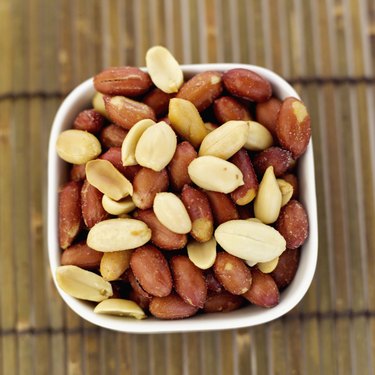
Peanuts are one a several crops that are vulnerable to aflatoxins, toxins produced by fungi that grow in or on certain foods and feeds. These natural contaminants are dangerous to both humans and animals -- and linked to cancer and death when ingested in large amounts. The good news is that regulatory agencies in the United States keep a very close eye on aflatoxins to ensure public safety.
Discovery of Aflatoxins
Video of the Day
Aflatoxins were first recognized in 1960, when more than 100,000 turkeys died on poultry farms in England. The disease, which was given the name, Turkey X disease, was traced to the peanut-meal feed that was given to the animals. The peanuts contained a toxin-producing fungus called Aspergillus flavus, from which the name, aflatoxin, comes.
Video of the Day
Not Limited to Peanuts
Aflatoxins are found not only in peanuts, but also in many other foods, including corn, milk, eggs, meat, nuts, almonds, figs and spices. In fact, corn may be the crop with the greatest risk worldwide, because it's grown year-round in climates ideal for fungal growth; it's also a staple food in many countries. Cottonseed is another crop that poses a high risk of fungal contamination. Aflatoxins are also sometimes detected in milk, cheese, eggs and meat when animals ingest contaminated feed.
Health Effects
Aflatoxins are labeled as a human carcinogens that have been found to cause liver cancer in animals and humans, according to the Environmental Health Trust website. Severe aflatoxin poisoning has been reported in many poor countries around the world. Acute aflatoxicosis, the syndrome resulting from exposure to aflatoxins, is characterized by vomiting, abdominal pain, pulmonary edema, convulsions, coma and death, notes the Cornell University website.
Safety Considerations
Aflatoxins are not considered a problem in the United States, according to the Berkeley Wellness website. The U.S. Food and Drug Administration allows low levels of aflatoxins in foods because it considers them as unavoidable contaminants. In many developing countries, aflatoxins pose a more serious risk, but in the United States, peanuts, peanut butter and other foods that may contain aflatoxins undergo rigorous testing. FDA guidelines allow no more than 20 ppb, or parts per billion, of aflatoxin in human foods. Still, there is concern about the possible long-term effects of low-level aflatoxin contamination. You can limit your exposure by purchasing peanuts and peanut butter from large, brand name manufacturers and by discarding any moldy, shriveled or discolored nuts, notes MedlinePlus.